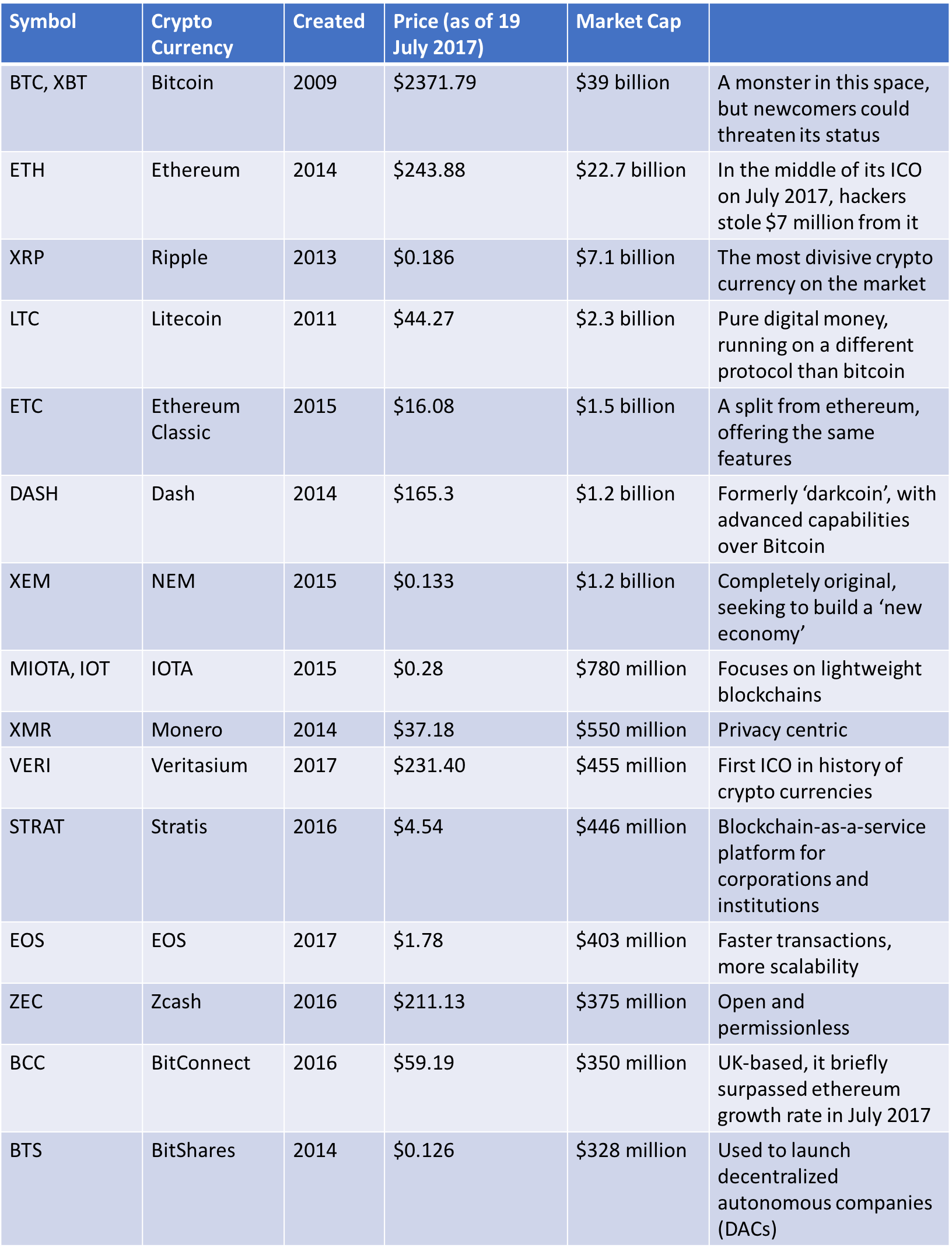Everything else has gone digital—so why not assets? It’s both a trader’s dream, and a hacker’s dream. Welcome to the age of the Crypto Exchanges, where you can buy, sell or exchange digital (crypto) currency.
There were massive changes in trading volumes in crypto exchanges, like Bitcoin and Ether in the first half of 2017, and it’s enough to suggest that the global market is being reshaped—so it’s time to learn more about the crypto exchange.
Download the key points of this post as PDF.
This market is maturing, but it’s still not mature, so there are still a massive number of red flags. The regulatory environment is very dynamic, and hackers are also a force with which to be reckoned. The future will undoubtedly see new types of products in this space as well. So if you’re ready to start dabbling in the crypt, make sure you’re prepared for a wild ride with our guide to this brave new world:
What are Crypto Currencies?
You’ve certainly heard of Bitcoin by now, even though it was ‘invested’ anonymously (or by an individual using an alias) only in 2009. Bitcoin is an alternative currency and it’s attractive because:
- There are no middle men (no banks) involved in the transactions
- No transaction fees
- Total anonymity
And, yes, you can actually use them, with more and more merchants accepting them because there are no credit card fees.
The real question is, how does someone create something that isn’t tangible like a Bitcoin, when it only exists in theory?
Well, that’s where it gets interesting. Bitcoins are mined—but not like any other metal. The miners in this case are people competing by using computers to solve complex math puzzles, and the winner is rewarded with bitcoins (about 25 bitcoins can be created every 10 minutes or so in this way). Basically, these miners give computers power to verify the transactions of other users. It’s a bit complicated, and gets even more so because it’s led to bitcoin cloud mining, which allows people to earn bitcoins without dealing with all the complicated hardware, software and other issues in the process.
Bitcoin is the leader and the trend-setter here, but here are the top 15 alt currencies by market cap:
 How Crypto Currencies are Valued
How Crypto Currencies are Valued
It’s hard to measure value here, and the closest tool you have that could be ‘fundamental’ is the cryptocurrency’s node count, which you get from its block explorer. Using the node count, you can figure out which crypto currencies are overvalued or undervalued. In other words, if a cryptocurrency has a node count that far exceeds its market capitalization, it’s either overbought or undervalued—check out its peers. The market doesn’t always get it right, so watch out for a correction.
Remember, these crypto exchanges are illiquid, so their prices fluctuate significantly. They also fluctuate a lot depending on new regulations or talk of regulations, technical challenges and changes, reputation (for instance, when someone gets hacked), and general sentiment.
Over the long term, much will depend on utility: whether more and more merchants adopt the use of crypto currencies.
Finally, these are still very small market, but that means that even small movements have big effects on prices.
How to Buy Cryptocurrency
The easiest way to think of cryptocurrency trading is as an alternative for Forex (Foreign Exchange) Trading: The trading of traditional currencies.
Crypto currencies aren’t exactly a stock and they aren’t exactly an asset from a returns perspective.
But the best way to research them to determine where to get in is from a penny stock perspective. In other words, the same way you would try to find a penny stock to play.
There are three types of crypto exchanges:
#1 Trading Platforms: Websites that connect buyers and sellers, with a fee charged for each transaction.
#2 Direct Trading: Platforms where you can trade directly with people all over the world, with no fixed market price and sellers set their own rates.
#3 Brokers: Websites set up to deal specifically in cryptocurrencies at prices set by the broker (they operate similarly to Forex brokers).
But, here’s where it gets confusing, if only because it’s different. You don’t get shares, you get digital coins or tokens.
Finding the Right Crypto Broker
There are more crypto brokerages than we can count, and each will have their own restrictions as to what currency they will accept for purchases of cryptocurrency. But you have to wade through them carefully. Keep an eye out for the following things when you’re vetting these brokerages:
- Does the brokerage have good reviews on relevant forums?
- Are the fees clear?
- What forms of digital currency does the brokerage deal in?
- Does it offer flexible payment methods?
- What are its verification requirements? Is it anonymous, and is this important to you?
- Does it have geographical restrictions (does it work where you are)?
- Do you understand the exchange rates, which can fluctuate? (Shop around)
The three most popular crypto brokerages are:
#1 Coinbase
Coinbase is a big one. This is probably a good place to start if you’re a newcomer to the crypt. This is where millions of people use, buy, store and trade digital currency securely.
Coinbase deals in Bitcoin, Ether, and Litecoin, which you can buy on your phone using their digital wallet, or from trading with others through Coinbase’s subsidiary, Global Digital Asset Exchange (GDAX).
Coinbase operates in the US, Europe, the UK, Canada, Australia and Singapore.
Pros: User friendly, good for beginners, secure
Cons: Not enough flexibility for advanced traders, too few types of digital currencies
StocksToTrade—now better than ever! We ushered in the New Year with some major advancements that include 3 unique features, exclusive to our Platform.
#2 Kraken
Kraken offers a bit more in terms of variety of digital currencies, but this isn’t for the newbie. It’s not nearly as user-friendly as Coinbase. With Kraken you can trade the following digital currencies:
- Bitcoin
- Ethereum
- Monero
- Augur REP tokens
- ICONOMI
- Zcash
- Litecoin
- Dodgecoin
- Ripple
- Stellar/Lumens
- EOS (as of July 2017)
And … you can trade between Bitcoins and US dollars, euros, Canadian dollars, British Pounds and Japanese Yen. So, it might have a bigger global reach, but again—this is for the more experienced trader.
Pros: Great flexibility for advanced traders, lots of digital currency options, high global accessibility
Cons: Too complicated for beginners
#3 Gemini
Gemini is gaining in popularity because its fully regulated and licensed to operate in the US, with Bitcoin and Ether. So it’s more like a bank for digital currency, with all US dollar deposits held at an FDIC-insured bank and the digital currency held in storage. Right now, there’s not a lot of flexibility here because no other digital currencies can be traded, and on US dollars are used in terms of traditional currency. But it’s a good one for someone looking to test the crypto waters for the first time, but it might not have enough options for the experienced trader.
Pros: Full regulated so by far the most secure, good for beginners
Cons: Low flexibility, only two digital currencies and only US dollars
There are plenty of others as well, some of them not yet in the big league, but moving up. Here are just a few:
- Poloniex: Boasting one of the highest trading volumes, with 100 different
- Bitcoin cryptocurrency pairings and advanced tools and data analysis (not for newbies).
- io: This brokerage tries to bring in both advanced traders and newcomers, with a simpler way for the novice to buy bitcoin at mostly market prices.
- Bitsquare: Unique because it’s a peer-to-peer exchange for which you don’t even have to register. It’s completely decentralized. This is straight up users trading with users.
So, when you get ready to take the plunge you have to consider your goals and your level of trading experience. If you’ve never done Forex before, make sure you start with a beginner-friendly brokerage. Dip your toes in the crypt first before you dive head first into these currencies. The brokerages differ wildly, so make sure you match yourself up with the one that suits you best.
Movement on the Maturing Market
The market for cryptocurrency is heating up right now. Why? It’s increasingly coming out of the dark. This isn’t the underworld anymore, and the law is coming out on the side of the crypt, and when that happens, it starts attracting institutional money and speculative money.
In May 2017, we saw a major surge in the cryptocurrency market. There was so much activity, in fact, that Coinbase went offline because it couldn’t handle the traffic. And then, Bitcoin crossed the $2,000 price point for the first time in its history.
Digital currency market caps have increase some 50%. But digital currency prices can fall as fast as they rise. Remember, small movement has a huge impact here. By mid-July 2017, Bitcoin was crashing, as the market started correcting itself following months of hyper speculation.
But, it’s also mature for hackers.
On 18 July, right in the middle of Ethereum’s ICO, hackers hijacked the CoinDash trading platform in the first known breach of a cryptocurrency funding campaign. CoinDash saw some $7 million in Ethereum sales diverted to a hacker. They were forced to terminate the sale.
Cryptocurrency is probably the currency of our future, but it’s got a lot of kinks to work out. If you want to get in on the ground floor, be prepared because this is a wildly volatile segment.
Check out STT’s new Twitter Streams! One of our most important new releases of 2017 is the inclusion of Twitter as a source of data for keeping up to date with the latest social discussions on a given stock. Every Stock tab includes a Twitter data feed which focuses only on tweets mentioning the company being tracked.

